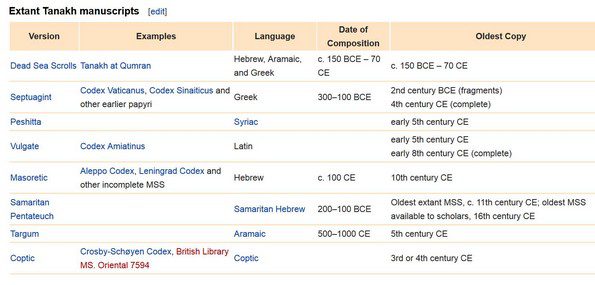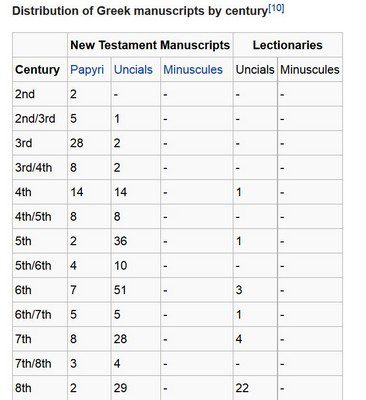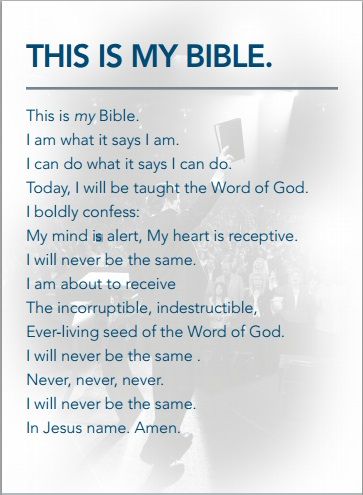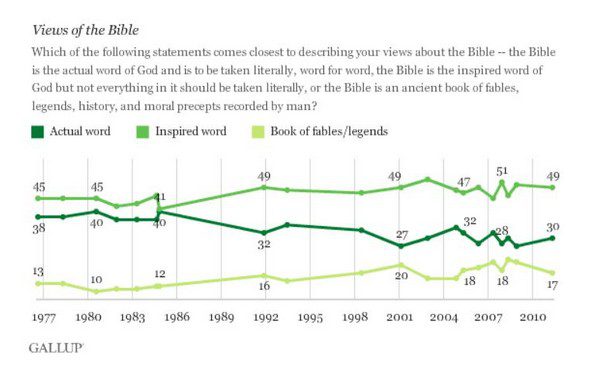
Repost from 2015. Edited, updated, and corrected.
Most Evangelical preachers and church members believe that the Bible they carry to church on Sundays is the inspired, inerrant, infallible Word of God. If you ask them if the Bible has any errors, mistakes, or contradictions, they will likely say, absolutely not! While they know that their Bible is a translation of ancient Hebrew and Greek manuscripts, they assume there is a perfect word line from God to the writers of the manuscripts to the translations they use.
Ask college/seminary-trained Evangelical pastors if the Bible has any errors, mistakes, or contradictions, and they will likely not say anything at first, and then will say, well, you need to understand ___________________________ (insert long explanation). They will likely tell you that modern translations are faithful or reliable, or that there are no errors, mistakes, or contradictions on any matter that is important to salvation. If you press them hard enough, they will tell you that no translation is perfect. (Remember, inerrancy demands perfection.) At about this point in the discussion, Evangelical pastors will say, I DO believe the original Greek and Hebrew manuscripts are inerrant (perfect, without error, mistake, or contradiction).
The next obvious question is this: so where are the original manuscripts? Well, uh, l-o-n-g pregnant pause, the original manuscripts don’t exist, the Evangelical pastor says. That’s right, the original manuscripts don’t exist. No one has ever seen or read the “original” manuscripts of the Bible. In fact, most of the extant manuscripts are dated hundreds and thousands of years after the events they record. According to Wikipedia, the oldest Old Testament manuscript (a fragment) dates back to the 2nd century BCE and the rest of the Old Testament manuscripts are dated from the 3rd century CE to the 11th century CE. Most of these manuscripts are NOT written in Hebrew.

But what about the Dead Sea Scrolls? Uneducated Evangelical church members erroneously think the Dead Sea Scrolls “prove” the Bible is the Word of God. Here is what Wikipedia says:
The Dead Sea Scrolls are a collection of 972 texts discovered between 1946 and 1956 at Khirbet Qumran in the West Bank. They were found in caves about a mile inland from the northwest shore of the Dead Sea, from which they derive their name. The texts are of great historical, religious, and linguistic significance because they include the earliest known surviving manuscripts of works later included in the Hebrew Bible canon, along with extra-biblical manuscripts which preserve evidence of the diversity of religious thought in late Second Temple Judaism.
The texts are written in Hebrew, Aramaic, Greek, and Nabataean, mostly on parchment but with some written on papyrus and bronze. The manuscripts have been dated to various ranges between 408 BCE and 318 CE…
Due to the poor condition of some of the Scrolls, not all of them have been identified. Those that have been identified can be divided into three general groups: (1) some 40% of them are copies of texts from the Hebrew Bible, (2) approximately another 30% of them are texts from the Second Temple Period and which ultimately were not canonized in the Hebrew Bible, like the Book of Enoch, Jubilees, the Book of Tobit, the Wisdom of Sirach, Psalms 152–155, etc., and (3) the remaining roughly 30% of them are sectarian manuscripts of previously unknown documents that shed light on the rules and beliefs of a particular group or groups within greater Judaism, like the Community Rule, the War Scroll, the Pesher on Habakkuk and The Rule of the Blessing.
So much for the Dead Sea Scrolls “proving” the Bible is the Word of God.


The oldest New Testament manuscripts date back to the 2nd century CE. Most of the extant manuscripts are dated from 9th century CE forward. Here is what Wikipedia says about the New Testament manuscripts:
Parts of the New Testament have been preserved in more manuscripts than any other ancient work, having over 5,800 complete or fragmented Greek manuscripts, 10,000 Latin manuscripts and 9,300 manuscripts in various other ancient languages including Syriac, Slavic, Gothic, Ethiopic, Coptic and Armenian. The dates of these manuscripts range from 125 CE (the John Rylands manuscript, P52; oldest copy of John fragments) to the introduction of printing in Germany in the 15th century. The vast majority of these manuscripts date after the 10th century. Although there are more manuscripts that preserve the New Testament than there are for any other ancient writing, the exact form of the text preserved in these later, numerous manuscripts may not be identical to the form of the text as it existed in antiquity. Textual scholar Bart Ehrman writes: “It is true, of course, that the New Testament is abundantly attested in the manuscripts produced through the ages, but most of these manuscripts are many centuries removed from the originals, and none of them perfectly accurate. They all contain mistakes – altogether many thousands of mistakes. It is not an easy task to reconstruct the original words of the New Testament….”
As you can see, there are no originals. Any talk of inerrant originals is just a smokescreen that hides the fact the extant manuscripts and EVERY Bible translation is errant. Any Evangelical who says that the Bible is inerrant in the originals is making a statement that cannot be proved. Every college/seminary trained-Evangelical pastor knows this, but few of them are willing to tell their congregations. Why? Why not tell church members the truth, the whole truth, and nothing but the truth? Preachers fear that their congregations will lose “faith” in the Bible and that the Bible will lose its authority if they tell them the truth. They would rather lie — and they ARE lying if they don’t tell their congregation the facts about the origin, translation, and text of the Bible — than have people doubt the Bible or God.
If there are no inerrant manuscripts, then there can be no inspiration. Most Evangelicals believe that God inspired (breathed out) the Bible. If you ask Evangelical church members exactly WHAT God inspired, they will likely point to their Bible. Ask Evangelical pastors the same question and they will likely start praying for the rapture to happen immediately. Why? Because the Evangelical doctrine of inspiration is based on the notion that the Bible is inerrant in the original manuscripts. Since there are no original manuscripts, and there are thousands of variations in the extant manuscripts and translations, then there is no such thing as an inspired Bible. At best, all that Evangelicals have is a flawed, errant translation of a flawed, errant, ancient manuscripts. Inerrancy and inspiration, as defined by Evangelicals, are myths, lacking any proof whatsoever.
This does not mean that the Bible has no value, but understanding that the Bible is not an inspired, inerrant text keeps a person from giving the Bible supernatural, God-like power. It may be a good book, a useful book, an inspirational book, but it is not a book that is straight from the mouth of God to our ears.
Our culture is awash with men and women who say they speak for the Christian God. What is the one belief that these speakers for God have in common? That the Bible is the inspired, inerrant Word of God. Every Sunday, Evangelical Joel Osteen, pastor of the largest church in America, leads his congregation in this:

The culture wars that continue to rage in the United States are based on the belief that the Bible is the inspired, inerrant Word of God. When Evangelical culture warriors quote proof-texts from the Bible, they believe they are speaking the very words of God — in American English of course. What they are really speaking are the words of an errant, fallible text that may or may not be the words of God/Jesus/Moses/Paul/Peter/James/John — to name a few. Since the original manuscripts no longer exist, it is impossible to know if the words of the Bible are God’s words. And even if the original manuscripts did exist, how could anyone prove that they were the very words of God? Would there be an endorsement statement on the last page that said, This is God and I approve of these words? Of course not.
The Evangelical Christian says, the pastor says, the denomination says, the Bible says, but there is no way of knowing what God said. And this is why the foundation of Christianity is not the Bible but faith.
Let me conclude this post by illustrating how pervasive is the belief that the Bible is inerrant/inspired. The following Gallop Poll charts tell a depressing story about how Americans view the Bible:

The percentage of Americans taking a literal view of the Bible has declined over time, from an average of 38% from 1976-1984 to an average of 31% since. However, highly religious Americans — particularly those of Protestant faiths — still commonly believe in a literal interpretation of the Bible.
In general, the dominant view of Americans is that the Bible is the word of God, be it inspired or actual, as opposed to a collection of stories recorded by man. That is consistent with the findings that the United States is a predominantly Christian nation and that Americans overwhelmingly believe in God.
Perhaps it is time for Christian churches to stop studying the Bible for a year so they can focus on reading and studying a few of Dr. Bart Ehrman’s books. Of course, if pastors did this they might risk being fired because their congregations would know that they’ve been lying to them about the Bible — and it IS a lie to omit facts about the origin, nature, and history of the Biblical text.
Until Evangelicals are disabused of their errant beliefs about the Bible, they will continue to arrogantly think that they have THE truth, that their God is the one, true, living God, and that the words of the Bible are God directly speaking to them. Until they understand that the Bible is not what they claim it is, there is no hope of having rational discussions with them. The Evangelical position can be summed up like this: God said it, end of discussion.
Notes
Some groups take inspiration and inerrancy a step farther and say that the King James Bible is the inspired, inerrant, infallible Word of God. The followers of Peter Ruckman even believe the italicized words added by translators to improve the reading and understanding of the King James translation, are inerrant and inspired. Ruckmanites believe the italicized words are an advanced revelation given to the translators by God.
Some Evangelicals believe that God has preserved his Words down through history. These Evangelicals admit that the original manuscripts do not exist, but they believe God, down through the centuries, has magically preserved (kept perfect) his Word, and that the King James Bible is the preserved Word of God for English-speaking people.
If you want a complete, detailed understanding of what most Evangelicals believe about the inspiration and inerrancy of the Bible, please read the 1978 Chicago Statement on Biblical Inerrancy. Here is a Who’s Who list of Evangelical scholars who signed the Chicago Statement.
Bruce Gerencser, 66, lives in rural Northwest Ohio with his wife of 45 years. He and his wife have six grown children and thirteen grandchildren. Bruce pastored Evangelical churches for twenty-five years in Ohio, Texas, and Michigan. Bruce left the ministry in 2005, and in 2008 he left Christianity. Bruce is now a humanist and an atheist.
Connect with me on social media:
Your comments are welcome and appreciated. All first-time comments are moderated. Please read the commenting rules before commenting.
You can email Bruce via the Contact Form.

So God, in his wisdom, knew to tell the modern publishers to italicize phrases and print Jesus’s word in red? Because he knew that humans would someday invent the printing press? And, that King James of Great Britain would order a special translation just for American Evangelicals? Sounds logical to me. 🙄
I agree with you about Bart Ehrman, his books are well worth reading, but the people who most need to read them won’t read them.
When fundy, I fondly imagined that early copies of scripture on vellum,were kept in pristine condition, lovingly looked after in monastery repositories etc.. Nothing is further from the truth. Damp and mould decayed them, so early transcribers and translators had to piece scraps together like a jigsaw of thousands of pieces. A missing phrase or word, or one made unreadable by mould, had to be guessed at. And I even understand that any verse that was nice to women, could be conveniently glossed over. Many were found in Genizahs, jewish repositories of old documents that again were in a million fragments and mixed with hundreds of personal family records too. When victorian explorers visited the Sinai Peninsula and got so excited about discovering ancient scraps of scripture, and the Codex Siniaticus was forming, local scammers got busy sometimes and sold them fakes, artificially aged to look real.
I naively believed that the Bible was the inerrant, inspired, literal word of God. As a child, I vaguely remember discussions about different translations of the Bible. At this time (1970s/early 80s) our Southern Baptist church was ok with some of the newer modern translations like “the Good News” Bible. Located just outside Nashville, our church had some members working at the Baptist Sunday School Board (later renamed Lifeway). When I was 12 or 13, some of my friends from church were selected to be photographed for a print edition of the Good News Bible marketed for adolescents and teens (I was not selected – I was not one of the “cool, popular” kids in youth group and didn’t even know about this until after the book was published and some of my friends were proudly showing off their copies 😮💨).
The fundamentalist Christian school I attended was KJV only (being an IFB-established school that pretended it was nondenominational). Their explanation was that since we had to memorize Bible verses, we needed to use the same translation. Implicit was that other translations were not allowed to be used on campus.
In college (a secular university that had a Divinity school), I took a History of Christian Thought course that rocked my fundamentalist evangelical world. That’s where I got the first inkling that there weren’t original manuscripts, that there were many ideas about the writing of the Bible, how the Protestant Reformation changed people’s views on the Bible, etc. I had already been told by my mother as a child that some of the Old Testament miracle stories might be allegories, but the fundamentalist schooling had prompted me to quietly put aside the concept of “allegory”. It was all quite confusing for an adolescent/teen whose grades and future were tied to academic success in a fundamentalist Christian school. There was a ton of cognitive dissonance that lasted for quite a long time.
Catholics don’t seem to care as much about inerrancy or literalism as they have centuries of tradition that they use, and their Papal leaders are able to change practices as they go. Protestantism had a lot of influence from “Sola scriptura” concept, and I think that fueled a lot of the inerrantist/literalism tendencies. There just isn’t the flexibility to change doctrine as much as times change and tradition is built. Sure, Protestants do stray from Sola scriptura, hence the vast number of Protestant denominations, many of which no longer cling to Sola scriptura or at least filter out the parts of the Bible that they don’t like.
I’m not sure where I’m going with this other than that I think the vast majority of Christians don’t question what they’ve been told at church about the Bible and don’t even bother to read it all. They think it’s special, sacred, holy, but it’s boring AF so most can’t manage to read all of it. It’s simpler to just follow what Pastor says.
Biblical inerrancy? Bugs said it best:
point of clarification: the phrase “God inspired (breathed out) the Bible” is incorrect, in that “inspired” means “inhaled”… if you want to get technical about it, “God /EXPIRED/ the Bible”. 😉
All Scripture is breathed out by God and profitable for teaching, for reproof, for correction, and for training in righteousness, that the man of God may be complete, equipped for every good work. 2 Timothy 3:16-17
The Greek word for inspiration can mean breathed in or out. 🤣❤️
How one Evangelical preacher defends “inerrancy”:
“Then people like BG and Dr. Erhman ignore the promise of God. It has been stated in the Bible that its words would not pass away or disappear till the end of time. This means that while there are some translations that are not so good, we still have the original words God gave his biblical writers.
It wouldn’t be fair or just to let one century or two centuries of people have God’s word and no one else gets to read it. God would not be able to punish those who disobey or reward those who obey if he did not keep his original words around for everyone to read.
The conclusion of this is that YES, evangelicals can continue to proclaim that the Bible we have in our hands is inerrant, original, and God’s words to us today. Of course, we limit the preserved words to only a few translations including The original NASB, KJV, NKJV, and the original NIT, other translations may be included but we are skeptical of some of the content in them.
We have God’s word today and they are without error,. They are infallible, inerrant, and not copies full of human mistakes.”
Notice that he has no evidence for his claims outside of “The Bible is inerrant because the Bible says the Bible is inerrant.” He appeals to magic — God preserved his words down through history. What’s more astounding and certifiably ignorant is his claim that certain translations — NASB, KJV, NIV — are inerrant. I don’t know of a NT scholar that would make such an absurd claim. Take the KJV and the NIV. Scores of textual differences, each using different manuscript families. They are not the same, thus both can’t be inerrant.
Oh the lengths Evangelicals go to defend the indefensible. Lying is a sin unless you are lying for Jesus.
The bible is not a ‘good’ book, if one simply uses an intuitive meaning of the word good. It is interesting in many ways, and study of it as an academic exercise is clearly useful. It is historically and scientifically worthless. Philosophically it makes the odd good point but, in reality they are points that most people would already be regarding as obvious, the good points are largely smothered by the silly nonsense, and a life lived without ever having awareness of the bible would not be diminished as a result. That said, there are many decent people who do set great store by the bible, though it’s because their decency stems from their fundamental goodness and not from the fact of knowing the bible.
To even express the terms ‘inerrant’ or ‘without contradiction’ in regard to the bible is just mind numbingly ridiculous.
Matilda—I had a similar notion about Biblical texts. I even wondered whether King James tucked them away after translating them. And OC, you’re right that Catholics, even the most conservative ones, don’t quibble much about inerrancy—mainly, I believe, because they don’t stress their fealty to the Bible as Fundamentalists do.